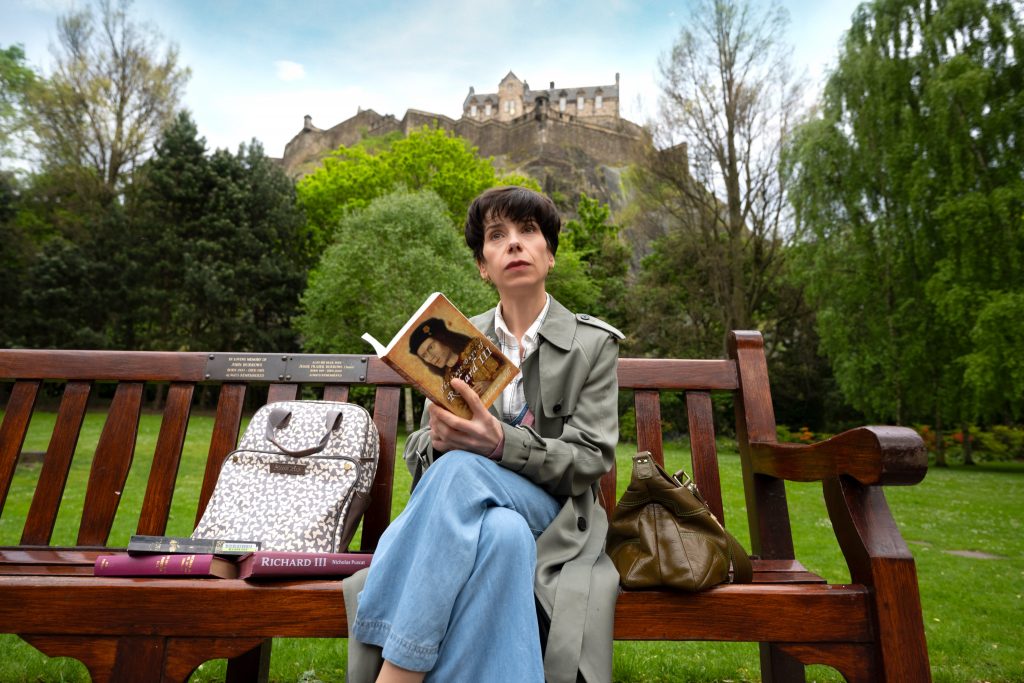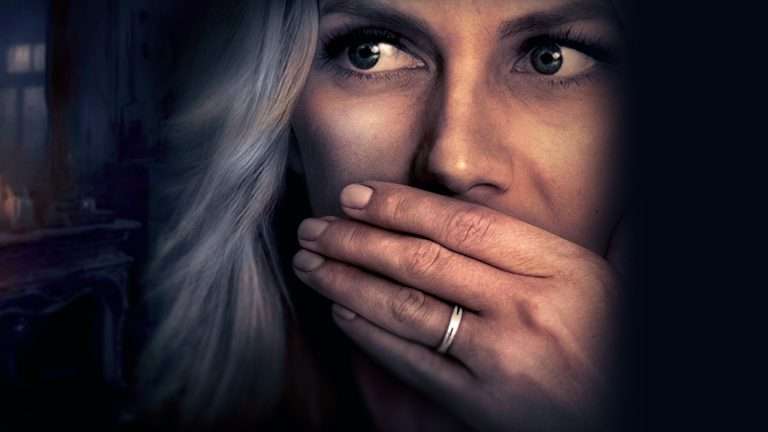The last time director Stephen Frears worked with the script by Jeff Pope & Steve Coogan, and they created an Oscar-nominated feature – Philomena. After the success of this sensitive tragicomedy, the writer-director collaboration is seen again in this year’s release – ‘The Lost King (2022).’ The director mentioned in one of his interviews his interest in telling the story of the woman who initiated the search to find King Richard III’s body.
Her tragedy seemed connected to the way the King was treated for centuries, and the film navigates that relationship instead of shadowing her contribution, the way it occurred in real life. The film is a fictionalized version of the narrative of this woman named Philippa Langley.
The Lost King (2022) Plot Summary & Movie Synopsis
Philippa Langley (Sally Hawkins) works at a sales office and struggles to manage the increasing work demands. While she has dedicated many years of her life to this workplace, she has been refused from getting a recent promotion. She is in her 40s and young, newly joined employees are getting more praise than her. As a result, she has an existential dilemma about her life and what she has achieved. Her chronic fatigue syndrome (ME) diagnosis also makes her undervalued despite her potential. While her professional life goes through this tragedy, her personal life is imperfect.
She is separated from her husband – John (Steve Coogan), and while he is dating other people, she is stuck with her emotional pain and taking care of her teenage sons. On the night of getting rejected for promotion, she attends a performance of a Shakespeare play with her sons and family friends. It is titled Richard III, and it speaks about the King who had a reputation only as a usurper by then. During the play, Philippa gets enamored by the portrayal of Richard by the theatre actor (played by Harry Lloyd). And contrary to popular opinion of him killing his kin and earning a bad reputation, she feels bad for him for he had been wronged and looks at him with a compassionate heart.

When her family friend mentions the King mockingly, she corrects him on a technicality – stating how Shakespeare’s account of the King cannot be true. By then, her interest in the matter seems to be on the surface level, where she connects with this man from another century – as someone who is wrongfully shamed and tortured. The next day, during an office meeting, she sees King Richard III himself outside the building. Even when she returns home, she sees him sitting on the bench outside their house. As a result, she goes on her journey to know more about him in any way possible.
From reading every possible book written about him to joining a fan club dedicated to strengthening his legacy in history, she does every possible thing. During this period of obsession, she stops going to her office, which creates a conflict with John since they ideally need both their salaries to run their family. Despite John ridiculing her, she keeps up with her pursuit. She meets with different enthusiasts on the subject who also believe that Richard has been wronged to be called a usurper and a hunchback. She firmly believes that such claims are baseless and fights against them with passion, despite her otherwise reserved nature.
Eventually, she goes to an archelogy department, sharing her findings and making them interested in her research. While they initially consider it a fool’s errand to look for Richard III’s body, they find it helpful for their department to stay afloat. They take up this project for the same reason. However, over the period, Richard Buckley (Mark Addy) from this department gets interested in this research just as much as her and starts making a case for it himself. Upon her suggestion, when they put a map from back then over the one in the present (in the decade when these events occurred), they realize the King’s body to be somewhere in a parking lot from the city. That is where she also had a hunch about Richard’s presence in the past.
While she looks to get funding for this project, Richard Taylor (Lee Ingleby) from Leicester University fights against digging this parking lot. He finds it going against all the factual research being done until then only because of the feeling Phillipa has. There is also a sexist prejudice where he considers her opinion worthless and even the task itself unworthy of funding. Nevertheless, after getting great funding offers, a radar survey begins. However, since they cannot find anything substantial, funding is pulled back by places, and this project hangs on Phillipa and Mr. Bukely’s shoulders, who are the only people invested enough to take it forward.
The Lost King (2022) Movie Ending Explained
Over the period, John and Phillipa become emotionally closer to the point that he sells his car to fund her passion project. With sufficient funding, she and Richard Buckley lead the digging of the parking lot. She shares a gut feeling of starting it from a place where the R sign was present. While it is supposed to be about ‘reserved car parking, she had connected it with Richard III. They start digging but do not find much on the first attempt. While they were about to lose hope, she urged them to keep working on the same spot, and eventually, they found a body of a person with a curved vertebra.
While that may link Richard to the rumors about his disability, she is delighted to find his presence. She acknowledges this success as if she has met a long-lost soulmate. With DNA research, it is later confirmed that it is indeed Richard III. In a gathering to celebrate the success of this exhumation, she shows up to find Richard Taylor from Leicester uni taking the credit. While Richard Buckley still supports her and understands her importance to the research proceeding, Mr. Taylor disregards her contribution. He conveys the details based on the research he has gathered about the King.
She finds it abhorrible that a physical abnormality is used to discredit a person’s moral conscience. She fights back against him and keeps her stance firm on this matter. Sometime later, in Bosworth Field, she meets King Richard III riding a horse, where he is known to have fallen in a battle. We share a moment of joy and recognition during this magic realist moment where she shows her faith in him as a rightful king and not a usurper. Kudos to her firm resolve (besides the following research) that helped him in being claimed as a king as he rightfully deserved. A seemingly ordinary woman leads a way to shape and rethink the way the Brits saw a part of their history.
The Lost King (2022) Movie Review
A tedious mishmash between tragedy and adventure
According to its Wikipedia description, ‘The Lost King’ is supposed to be a comedy-drama film. However, after watching about two hours of its duration, I am unsure if it is justified. This film, directed by Stephen Frears and written by Steve Coogan and Jeff Pope, can sometimes be considered a lighthearted drama during its mundane moments. Perhaps that is how comedy is conceived these days, but the film feels humorous in no way. It rather feels like an adventure of a middle-aged woman who escapes the mundanity of daily life to seek justice for someone, who has been wronged, the way she has been in her life.
While this connection between Philippa and Richard III’s characters is clear early on, the film is utterly confused about its tonality. It does not comfortably settle in any of its supposed genres. On one side, we see Philippa’s obsessive, driven quest, despite going through torment against a world that ridicules her. That very aspect of torment feels so heavy-handed because the film suddenly starts feeling more of a tragedy of this pitiable woman than an intense drama about her determination. For much of its part, it swings between a devastating tragedy and a monotonous adventure.
What ‘The Lost King’ lacks is an interest in understanding this woman beyond the troubles she went through. The creators paint a picture of a woman wronged by the system. As a narrative, we get a character to root for and an antagonist to despise. For a moment, I would also keep aside the allegations by Richard Taylor, who claimed the untruthful version of the events being showcased in the film, especially about his image. What the film still ends up doing wrong is getting bogged down by its ethical ambitions. It wants to be so many things simultaneously – from an idealistic film to a tragicomedy, from a sincere drama to an adventure.
Somehow, it just creates an exceptionally awkward mishmash of all these elements that do not fit right together to form a seamless entirety. We may resonate with the film’s noble intentions in its bits and parts. Sadly, the film is not just bits and pieces. Seeing a dull bore about a woman whose life was more thrilling than tragic, especially during this period in her life, is disappointing, to say the least. I always have reservations about Brits and their fascination with their royalty and era of glory that completely neglects the history of injustice by the same folks.
The film still feels noble for its investigation of simpleton finding a purpose to her life in seeking justice for someone as misrepresented as her. Only if the film had a clear vision would it have become effective.








